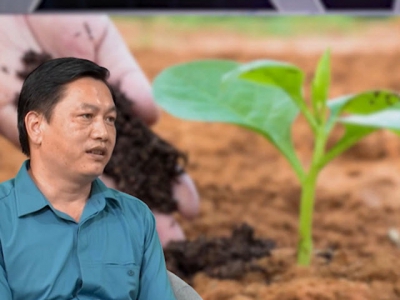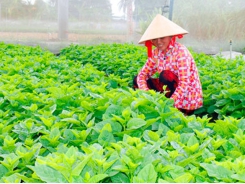The potential to develop organic fertilizer production is huge

After more than two decades of constantly pursuing an organic track, Que Lam Group is now producing 1 million tons of organic fertilizer yearly, capturing the country's largest market share.
Mr. Khac Ngoc Ba, Deputy General Director of Que Lam Group. Photo: Nguyen Huan.
Mr. Khac Ngoc Ba, Deputy General Director of Que Lam Group, said that the company has been a pioneer in organic and microbial fertilizer manufacture for over two decades and is actively supporting organic agriculture production.
Mr. Ba underlined that in order to maintain a sustainable farm and a healthy ecosystem, input material is critical. If agricultural inputs are clean, either the agricultural products or the environment will be clean as well.
If we want to have safe agricultural goods, we must include organic and microbiological production technologies into farming from the start. Standardization begins at the input level can benefit both producers and consumers by ensuring the safety of agricultural goods and a healthy ecological environment.
He added that the development of organic fertilizer in particular, and organic agricultural production in general, is smooth from the center to the local levels, owing to a fully developed legal framework, standard, and protocol. This is an ideal atmosphere for organic agricultural enterprises to grow and prosper.
Additionally, our country's rate of adoption of organic and microbial fertilizers is still low, providing a greater chance to diversify cultivation by introducing the new type of fertilizer into agriculture.
With microbial organic fertilizers accounting for around 3% of all fertilizers used today, according to Mr. Khac Ngoc Ba, the market for organic fertilizer manufacturing remains very vast for all firms.
However, for organic agriculture to really succeed, it is required to invest heavily in organic fertilizer products made in an industrial and modern method, in addition to the traditional method.
As a consequence, Que Lam Group invested in modern manufacturing lines and technologies between 2018 and 2020 in order to manufacture tons of industrial organic fertilizers. This is a significant step toward the agricultural use of microbial organic fertilizers.
However, Mr. Khac Ngoc Ba said that in order for organic fertilizer production to grow swiftly and sustainably, the communication stage is critical for changing farmers' understanding and practices around fertilizer use.
Because the Que Lam Group's 20-year history of manufacturing microbial organic fertilizers demonstrates that Vietnam's technology and raw ingredients are now easily accessible, if not redundant.
That is tens of millions of tons of peat, garbage, and by-products from agriculture, animal husbandry, and aquaculture that, if not collected, pose a significant danger of inflicting environmental damage.
That is also why Que Lam Group invests substantially in technology that converts wastes and by-products into raw materials for the manufacture of microbial organic fertilizers.
"Over the years, we have shown that when we begin growing crops using microbial organic fertilizers and biological products, yields are consistent, quality is high, and pests and illnesses are significantly reduced," Mr. Khac Ngoc Ba noted.
As he noted, bringing fresh materials from waste and by-products of cultivation, husbandry, and aquaculture that have not been treated with microbiological technology or composted without ensuring fertilizer application to plants results in an immediate benefit but leaves behind numerous epidemic consequences. As a result, it is essential to treat using technology prior to cultivating.
Que Lam Group has also been transferring technology to all gardeners and farmers in recent years, with preparations for converting agricultural waste and by-products into safe organic fertilizers.
The Group wants to continue guiding local governments in better coordinating their efforts to increase and promote the use of microorganic fertilizers in agricultural practices by around 3-5 percent.
The growing cost of inorganic fertilizers, which has reached an all-time high in relation to the cost of agricultural goods, has created a slew of issues for farmers and companies. Mr. Khac Ngoc Ba advised firms involved in organic fertilizers and microorganisms to engage with and help farmers toward increased use of efficient and inexpensive organic fertilizers, both to alleviate pressure on inorganic fertilizers and to benefit domestic agriculture in the long term.
Related news
Tools

Phối trộn thức ăn chăn nuôi

Pha dung dịch thủy canh

Định mức cho tôm ăn

Phối trộn phân bón NPK

Xác định tỷ lệ tôm sống

Chuyển đổi đơn vị phân bón

Xác định công suất sục khí

Chuyển đổi đơn vị tôm

Tính diện tích nhà kính

Tính thể tích ao



 VnSAT has a far-reaching effect on coffee industry…
VnSAT has a far-reaching effect on coffee industry…  Massive planting of orange trees should be minimised…
Massive planting of orange trees should be minimised…